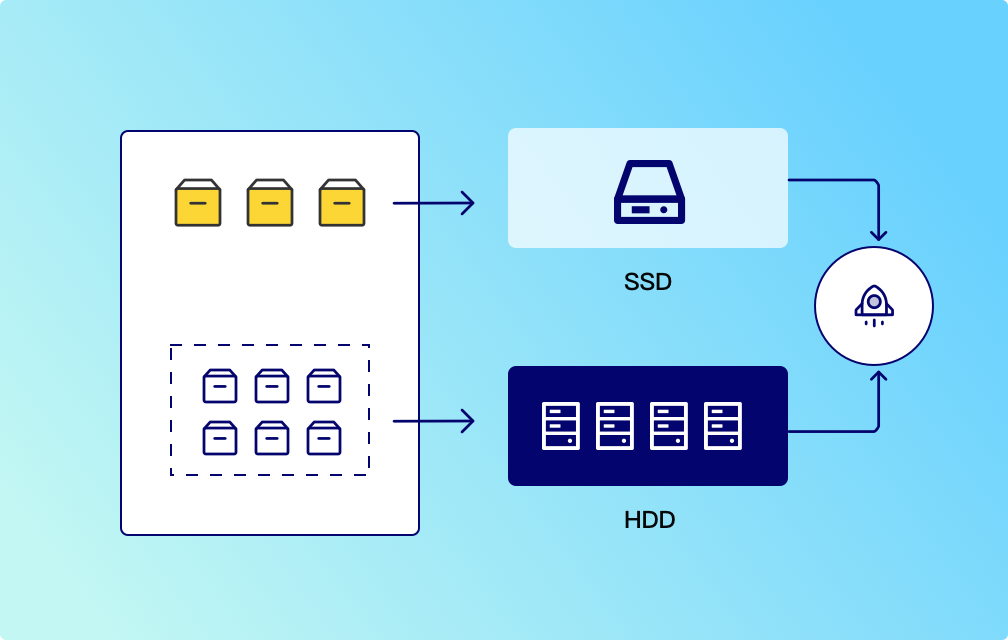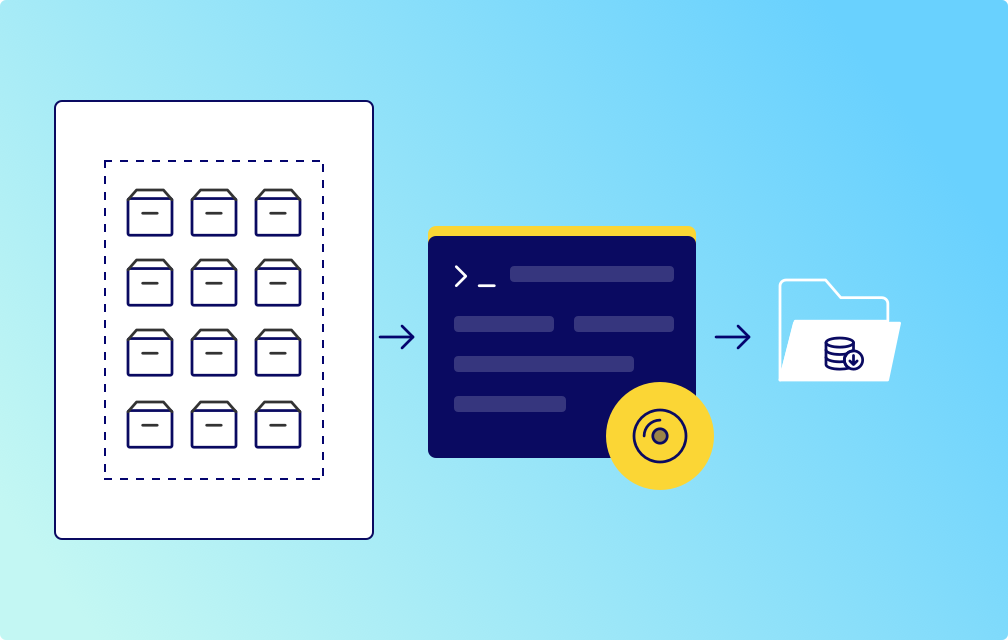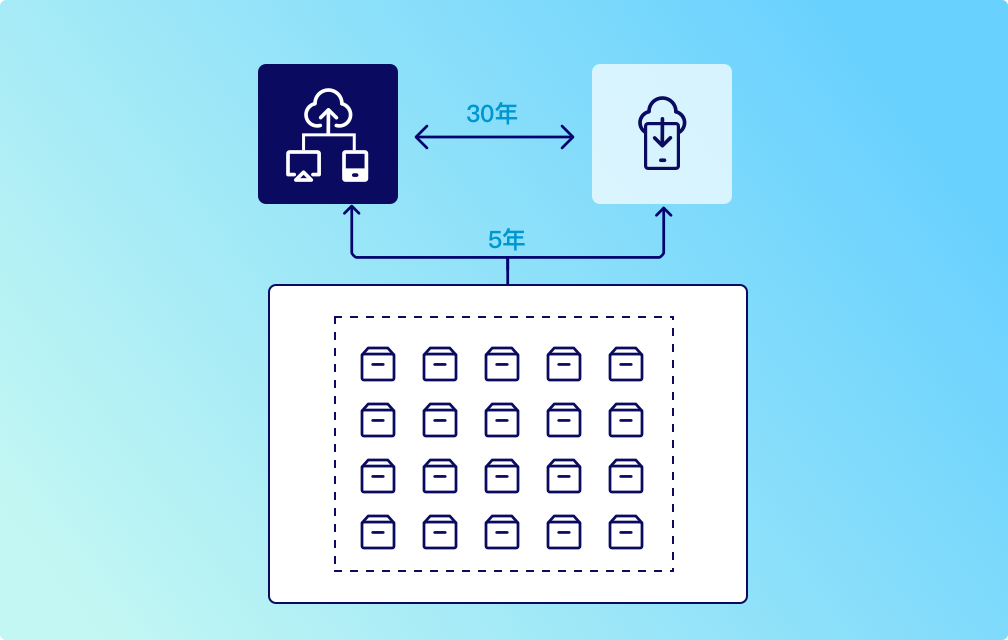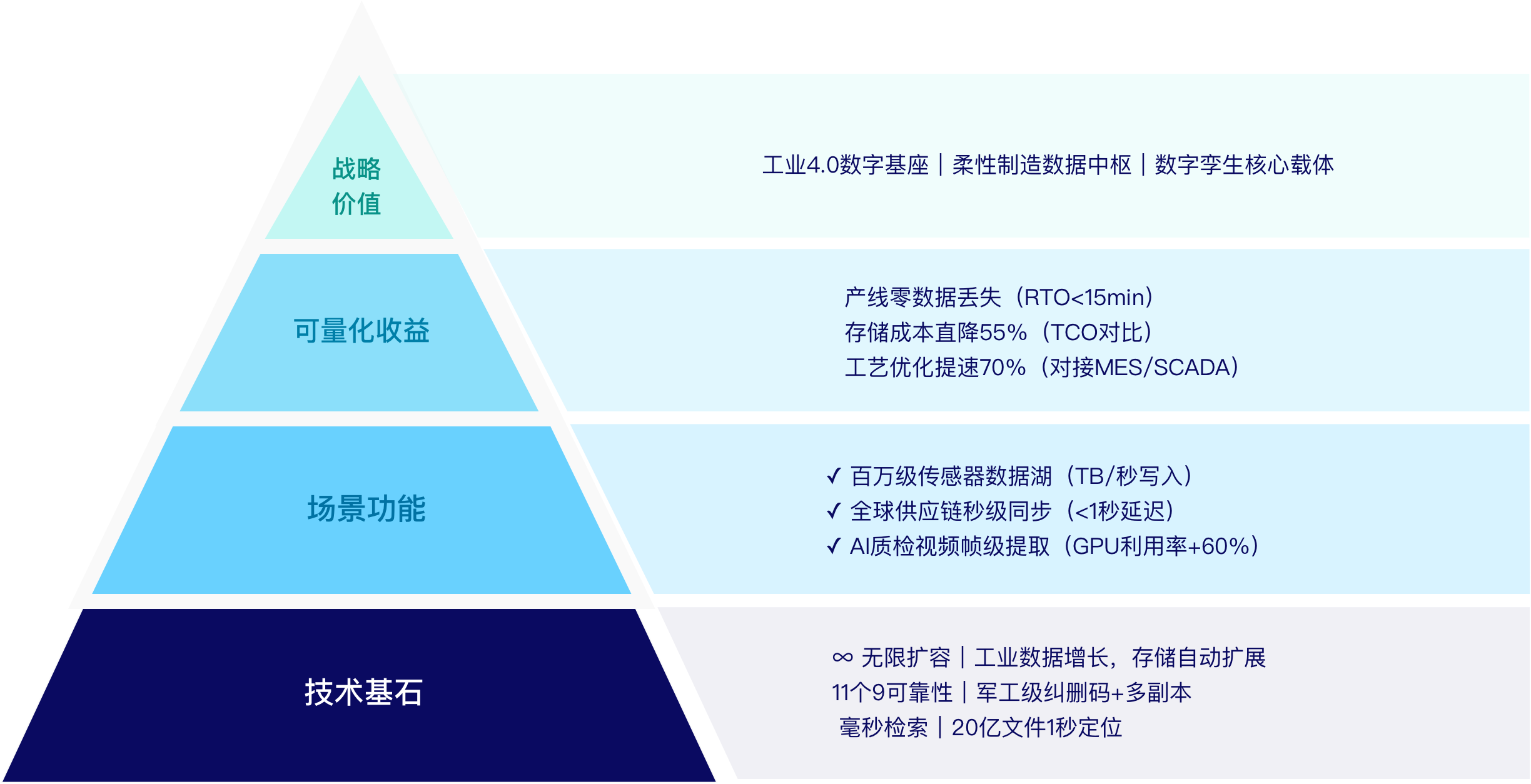Industrial Production Solutions
Storage, quality inspection, tracking and long-term preservation of massive data in industrial production, reducing costs and increasing efficiency
Four Core Pain Points in Industrial Production
| Pain Point | Specific Scenarios/Challenges | User Requirements |
|---|---|---|
| Massive Data Storage and Scalability | Industrial production generates PB-level data from sensors and equipment, traditional storage is difficult to expand and costly. | Elastic storage capacity expansion, support dynamic growth, reduce hardware investment and maintenance costs. |
| Real-time Processing and Low Latency | Real-time monitoring, predictive maintenance scenarios require millisecond-level data read/write, traditional storage has high latency affecting decision efficiency. | High concurrent read/write capability, support real-time data analysis and edge computing, reduce response time. |
| Data Security and Compliance | Industrial data involves core process parameters, must meet GDPR, ISO 27001 regulations, prevent leakage and tampering. | End-to-end encryption, fine-grained permission control, audit logs, ensure data lifecycle compliance. |
| Multi-source Heterogeneous Data Integration | Industrial environments have multiple protocols/formats like S3, NFS, databases, scattered storage leads to complex management and low utilization. | Unified storage platform compatible with multi-protocol access, centralized data management and seamless cross-system calls. |
Solutions
SSD and HDD Tiered Storage Cost Reduction

SSDs provide fast read/write speeds suitable for applications requiring high I/O performance, while HDDs are lower cost and suitable for large-capacity storage. By storing frequently accessed data on SSDs and infrequently accessed data on HDDs, costs can be reduced without sacrificing performance.
Core Advantages of Tiered Storage
- No Performance Compromise: Achieve SSD acceleration for business needs
- Cost Cut in Half: HDD usage for 70% performance data
- Automated Operations: AI predicts data lifecycle
- Elastic Scaling: On-demand expansion + comprehensive cloud access
- Risk Distribution: Media backup + data mirroring
- Green Low Carbon: Energy saving + low carbon utilization
Use SSD for performance, HDD for cost reduction, achieve "using good steel on the blade" for storage spending through intelligent tiering
SSD+HDD Tiered Storage vs Single Storage Solution Cost Comparison
| Comparison Item | Pure SSD Solution | Pure HDD Solution | Tiered Storage Solution |
|---|---|---|---|
| Storage Media Cost | Extremely High ($6~8/GB) | Extremely Low ($0.03/GB) | Mixed Cost (SSD only stores 20% hot data) |
| Performance | 0.1ms latency | 8~10ms latency | Hot data 0.15ms, cold data on-demand read |
| Energy Consumption (1PB/year) | 250,000 kWh | 300,000 kWh | 120,000 kWh (SSD low power + HDD sleep) |
| Capacity Expansion Cost | Full expansion required | Performance bottleneck | Tier-by-tier expansion (e.g., HDD tier only) |
| 5-year TCO (Total Cost) | $6.7M | $2M | $2.65M (60% savings vs SSD) |
| Applicable Scenarios | Real-time trading, high-frequency read/write | Archive, backup | 90% enterprise mixed workloads (database/file services) |
Cold Backup Storage Cost Reduction

Compared to traditional tape storage, Blu-ray discs have lower storage costs, especially for large-scale storage. The cost-effectiveness of Blu-ray technology makes it an ideal choice for large-scale data archiving.
Blu-ray storage devices consume far less energy during operation than hard disk drives (HDDs) or solid-state drives (SSDs), meaning lower energy costs.
Core Advantages of Cold Backup Storage
- Lower Cost: Blu-ray disc cost per GB is only 15% of original hard disk solutions
- Long-term Reliability: No need for regular data migration
- Compliance Security: Military-grade encryption protection
Cold backup storage reduces low-frequency industrial data archiving costs by 60% through intelligent tiering and elastic scaling, balancing security compliance with efficient resource utilization
Cost Comparison (1PB/5 years)
| Media | Total Cost | Energy Consumption | Lifespan |
|---|---|---|---|
| Blu-ray Storage | ¥2.2M | 1,200 kWh | 50+ years |
| Tape | ¥3M | 2,800 kWh | 30 years |
| HDD Series | ¥4.93M | 6,500 kWh | 5 years |
Multi-Cloud Transformation Cost Reduction

Cloud storage achieves cost reduction and efficiency improvement through integrated dynamic scheduling of data resources, allocating hot and cold data storage networks on demand, calculating based on each cloud vendor's solution, utilizing standardized interfaces to select optimal paths nearby, completing combined reserved/elastic instance cost optimization.
Simultaneously supports industrial IoT data, service images and other unstructured data and atomic data cloud and edge computing, reducing storage costs by 20%~40% on the basis of domain business continuity, building the most price-competitive infrastructure.
Core Advantages of Multi-Cloud Transformation
- Patented Cross-Cloud Scheduling Algorithm: Critical business elastic SSD acceleration
- 30% Cost Savings Commitment: HDD carries 70% low-frequency data
- 8 Industry Ready-to-Use Solutions: AI predicts data lifecycle
Technology Value Pyramid

Based on military-grade reliability and infinitely scalable distributed object storage technology, achieve zero-loss intelligent production throughout the industrial data chain, support AI quality inspection and real-time global supply chain collaboration, driving manufacturing enterprises toward agile Industry 4.0 evolution